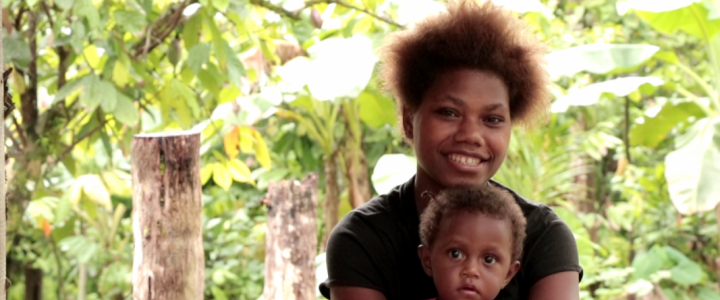Seeking a range of views and experiences from the people we work with, like Nancy, a young mother in Papua New Guinea, increases our confidence that our community development is reaching the right people in the best way. Photo: World Vision.
Through the Code of Conduct ACFID members commit to investing in quality assessment of their work (4.3) and to reflect, share and apply the results and lessons of their work with others (4.4). In this blog, Katie Chalk, from World Vision Australia and co-chair of ACFID’s MEL Community of Practice, reflects on the powerful role that effective monitoring, evaluation and learning can have in challenging the status quo and how members are working together to do this better.
The international aid and development sector must have confidence in their contribution to development goals. As organisations, we recognise this, but see, prioritise and define it somewhat differently. For some it’s monitoring and evaluation (M&E) or its logical extension, monitoring and evaluation for accountability and learning (MEAL, of course); others go straight to the outcomes of Evidence and Learning (E&L); most recently, many of us have taken up terminologies around evidence of impact at scale (no consistent acronym yet, thank goodness). I’m going to call it MEL for the rest of this blog, because that, in the end, was what we decided to call our ACFID Community of Practice focusing on the common themes, challenges and collaborative opportunities of top quality monitoring, evaluation and learning. More about that later.
Whatever we choose to call it, it’s important to recognise that all ACFID members have agreed to a consistent and ethical application of ‘deep contextual analysis based on evidence and experience’ (4.2). MEL is a primary responsibility of international NGOs working across humanitarian, development and social policy programming. For some of us, it’s also a calling. It gets us out of bed each morning. That juxtaposition of inputs we helped to design: is it working? Why? How do we know? And – really importantly – how does it look from the other side, the views and priorities of partners, communities and individuals we work with? Are we implementing or are we imposing? Sometimes I think MEL is the conscience of our sector; it keeps us connected to the promises we make.
MEL practitioners are also advocates; we focus our energy not only on learning all these vital elements to international programming practice, but also on making sure the lessons are used, in a constant cycle of reflection, introspection, innovation and improvement. We knock on doors to peddle our data, lessons and methodologies and see them come to life. It is not always easy, because we are asking for investment, collaboration, and trust in new ideas, often in competition with ‘bottom-line’ priorities for financial and human resource.
Excellent work is taking place under the evidence principle, and, though it’s still a challenge, the Australian aid sector is also moving towards more effective sharing of MEL practices and outcomes. The valued partnerships and connections forged through DFAT ANCP help us find each other, along with connections to the academic sector through the Research for Development Impact (RDI) Network. Most recently, our fledgling ACFID MELCOP has put out a call for members to drive and join discussions on the areas of work which inspire, motivate or challenge us the most. For instance, we started by considering strategic MEL and how we measure our progress and value as organisations through our contributions to international outcomes. We’ve been looking at ways NGOs can collaborate to build a strengthened case for investment in aid, through increased sharing and market promotion of our impact-level change.
The MELCOP has also been reaching out for thought leadership and collaboration to understand the implications of Australia’s international programming in the COVID19 era, not only operationally – how do we continue to monitor and evaluate under restricted access? – but conceptually – how do we understand, document and mitigate the effects of the pandemic across rapidly changing contexts? How can we actually help here?
In this, we have always been clear that we don’t know the answers. But I am grateful that we MEL practitioners have the networks to raise the questions, share the experiences and continue to push for investment in reflection and learning as a fundamental principle of our work.

Katie Chalk
Katie Chalk is Australian Aid Impact Advisor for World Vision and co-chair of the ACFID MELCOP. You can join the ACFID MELCOP by emailing [email protected] – we’d love to welcome you to our tribe.









